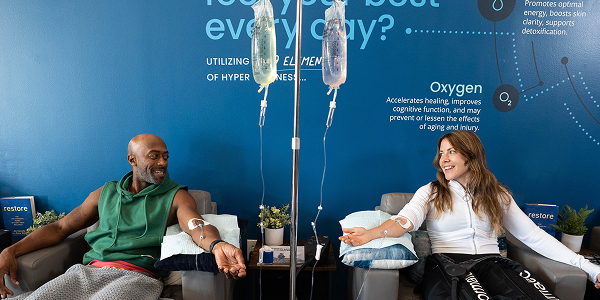We’ve all been there before: It’s 1 a.m. and you fell asleep fine three hours ago, but suddenly, you’re wide awake, tossing and turning, unable to fall back asleep. Thoughts race through your head about your day, your week, work, relationships, etc. And you wonder: Should I get up or should I stay in bed and hope that I fall back asleep?
Unfortunately, there’s no easy answer. If it’s just for a few minutes and anxiety doesn’t seem to be getting the best of you, staying in bed and trying to let go of any negative thoughts is probably a safe bet. But if you can’t fall back asleep and you’re just laying there in a bed of self-loathing because you can’t sleep, you’re simply creating a negative feedback loop that can be hard to escape from. So perhaps it’s best to get up for a few minutes, avoid the blue light of your phone or computer, and do something that might make you tired.
That’s right: The best advice I’ve ever been given when I can’t sleep is to read something that bores you. A few minutes of Paris Review’s Sleep Aid series usually does the trick for me, but study up and pick your options carefully. And in case you need more hacks to improve your sleep, here are a few easy ways to improve your sleep.
1. Increase your exposure to sunlight in the morning and late afternoon
Exposure to sunlight in the morning stimulates your brain’s circadian rhythm, which regulates the 24-hour sleep-wake cycle. Exposing yourself to sunlight in the morning is an easy way to trigger hormones in your brain to keep you awake. Conversely, exposing yourself to darkness does the opposite, triggering sleep hormones in your brain to be released as you prepare for a night of rest, and this also leads to our second sleep hack.
2. Avoid blue light exposure in the evening
Blue light exposure, the same type of light emitted from your phone and laptop, tricks your brain into thinking it’s still daytime. Fortunately, there are ways around this. Most sleep experts will say, lay off screen time up to two hours before you plan on going to sleep, but as we all know, that’s a tall ask. So you can work around it by using apps that block blue light and also glasses that block blue light. And if you’re a Kindle reader, choose the Paperwhite option to read at night and avoid blue light. Or, you can always go old school and read a real book printed on paper…
3. Avoid caffeine and alcohol
Caffeine keeps you up. If you can stop caffeine intake up to 6 hours before your planned bedtime, your brain and body are more prone to sleep. As for alcohol, many people think it’s a sleep aid, when in actuality, it can reduce nighttime melatonin production and also potentially disrupt your sleep patterns. As a Fitbit user, I can personally attest to the effects alcohol has on my sleep, because 1-2 drinks at night drastically lowers my deep sleep, which helps restore energy, regenerate cells and repair tissues. If you can stop coffee intake by the afternoon and limit your alcohol intake at night, your sleep will surely get better.
4. Stick to a regular sleep schedule
Your circadian rhythm is set on a 24-hour loop, and performs best when you adhere to a regular sleep schedule. Pick a targeted bedtime each night, along with a targeted wake up time each morning, and stick to it as best as you can. Trust me, your body will thank you in a few weeks, and your long term sleep quality will improve.
5. Optimize your bedroom
If you live in an area with a lot of outside noise, consider a white noise machine. If your bedroom doesn’t get dark enough, consider blackout curtains, and if possible, regulate your bedroom temperature. It’s easier to fall asleep when your bedroom is slightly colder. I for one, sleep wonderfully in quiet hotel rooms with blackout curtains and powerful air conditioning. Do some experimenting to see what works best for you though!
6. Consider Mild Hyperbaric Oxygen Therapy
Restore’s Mild Hyperbaric Oxygen chamber is a cozy space where you can access increased levels of oxygen that help fuel the most important functions of your body. And it can also help optimize sleep! High levels of oxygen can help the brain reach deep, restorative sleep easier. This isn’t a one and done visit though. Regular hBot visits will help optimize sleep and regain your cognitive edge. Try it today and have a good night!
Learn more about Restore Mild Hyperbaric Oxygen Therapy.



.jpg)


